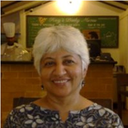Distinguished Fellows
|
Prof. Subbiah Arunachalam (known to friends as Arun) started his career as a research chemist, but found his calling in information science. In the past four decades, he has been a student of chemistry, a laboratory researcher (at the Central Electrochemical Research Institute and the Indian Institute of Science), an editor of scientific journals (at the Publications and Information Directorate of the Council for Scientific and Industrial Research and the Indian Academy of Sciences), the secretary of a scholarly academy of sciences (IASc), a teacher of information science (at the Indian National Scientific Documentation Centre), and a development researcher (at the M.S. Swaminathan Research Foundation and the Indian Institute of Technology Madras). While working with M.S. Swaminathan Research Foundation, he initiated the South-South Exchange Traveling Workshop to facilitate hands on cross-cultural learning for knowledge workers from Africa, Asia and Latin America engaged in ICT-enabled development. Arun is on the editorial boards of six international refereed journals including Journal of Information Science, Scientometrics, and Journal of Community Informatics; a member of the international advisory board of IICD, The Hague, a trustee of the Electronic Publishing Trust for Development, and a Trustee of the Voicing the Voiceless Foundation. Improving information access both for scientists and for the rural poor; scientometrics, ICT-enabled development and open access are among his current research interests. |
| Rishab Aiyer Ghosh is a researcher based in Maastricht. He is an Open Source Initiative board member, the founding international and managing editor of the peer-reviewed journal First Monday, and the Programme Leader of FLOSS at UNU-MERIT. He has undertaken several global, high-profile studies on Free Software. He is a jury member for Global Bangemann Challenge (now Stockholm Challenge Award), a prestigious prize awarded to IT projects with socio-economic impact by the mayor of Stockholm and founder member of the GII Internet Commerce Brain Trust. From 1995–1999, Rishab has worked as an editor at The Indian Techonomist, an analytical newsletter on Indian media and communications targeted at a global audience, an analyst and newsletter contributor for US-based Paul Kagan Associates, and a weekly columnist on Internet society (Electric Dreams). He still writes regularly, with over half a million words published in journals, newspapers and magazines worldwide, from PC Quest India to Wired Magazine, USA. From 2008, he heads the Collaborative Creativity Group at UNU-MERIT. |
|
Beginning his career at the State Bank of India, he was a Senior Manager, Management Consulting Services, at Price Waterhouse in San Francisco, M&A Head for Citibank in India, and thereafter managed a partnership doing alliances, business strategy, and financial placements in New Delhi for major international and domestic clients. Subsequently, he was an independent consultant in India and abroad. His experience is in financial placements, M&A, and business strategy for clients in IT, telecommunications, power, oil/energy, airlines, biotechnology, banking/financial services, hotels, shipping, railroads, manufacturing, agri-business, law firms, and retail enterprises. He has advised the government on public policy since 1990, primarily in telecommunications. As a columnist for the Business Standard, he writes on infrastructure and managing economic reforms (http://organizing-india.blogspot.com). He has an MBA from the University of California at Berkeley, an MA (History) and a BSc (Physics) from Madras Christian College." |
 |
| Tejaswini Niranjana is presently a Senior Fellow at the Centre for the Study of Culture and Society (CSCS), Bangalore, and Visiting Professor at Tata Institute of Social Sciences (TISS), Mumbai. At CSCS (www.cscs.res.in), Tejaswini helped set up in 2001 an inter-disciplinary doctoral programme in Cultural Studies, and many of her Ph.D. students have brought Indian language materials into their research and writing. At TISS (www.tiss.edu), Tejaswini is incubating the Centre for Indian languages in Higher Education, which will anchor a multi-institutional programme for Indian languages in higher education, including production of new resources, curriculum strengthening, research training, digitisation and archiving. On the anvil is the creation at TISS of a digital hub for Indian language resources for tertiary education. She is also Lead Researcher of the Higher Education Innovation and Research Applications (HEIRA) Programme at CSCS (http://heira.in). HEIRA works towards sectoral transformation in higher education, working with private and public institutions to design and field-test new methods for curriculum development, teacher training and institutional change at the undergraduate and post-graduate levels. Tejaswini is co-author of a policy note on quality education in Indian languages, the recommendations of which are now part of the final 12th Plan document (http://www.ugc.ac.in/ugcpdf/740315_12FYP.pdf). Select publications are available from cscs.academia.edu. Her best-known book is Siting Translation: History, Post-structuralism and the Colonial Context (Berkeley: University of California Press, 1992). More recently, she published Mobilizing India: Women, Music and Migration across India and Trinidad (Durham: Duke University Press, 2006). Tejaswini is the Adviser (since February 2013) to the 'Access to Knowledge' programme of CIS and will guide the A2K team in expanding the Indian language Wikipedias and in increasing the number of active editors through strategic partnerships with Higher Education institutions across India. |






